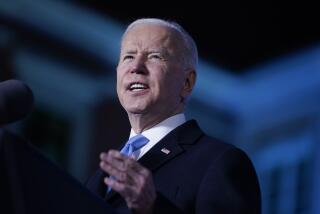Senate Budget Committee Leader Suggests Special Income Tax to Finance War
- Share via
BOCA RATON, Fla. — The head of the Senate Budget Committee on Saturday called on President Bush to impose a special tax to finance war in the Persian Gulf if fighting breaks out.
“If the situation deteriorates, if we get into a full-blown war in the Middle East, I think it is going to be incumbent on the President perhaps to propose some type of surtax or some other type of measure to pay for the war,” said Sen. Jim Sasser (D-Tenn.), chairman of the Senate Budget Committee.
“We simply cannot continue to borrow to finance a war to protect the oil supply for our friends in Japan and Western Europe,” Sasser told reporters after addressing the Securities Industry Assn.
The tax might take the form of a temporary income surcharge, such as the 10% levy imposed in 1969 to finance the Vietnam War, he said.
He told the conference that U.S. Treasury borrowing to finance a war would send the budget deficit ballooning and drive up interest rates. This would damage prospects for economic recovery and ruin Congress’ hard-fought accord to cut the federal deficit by $496 billion over the next five years.
“We cannot sustain the expense of a full-blown war there with our current budgetary problems,” Sasser said.
The Vietnam and Korean wars led to inflationary surges that damaged the economy.
Sasser said he expects that Congress would support a special tax initiated by the White House, if the President convinces the public that war is in the national interest.
The Senate budget chairman said he has not discussed the idea widely with the White House or with other congressional leaders.
He said he expects that the current military commitment of about 240,000 troops in Saudi Arabia can be financed within the existing Pentagon budget, “or with a relatively modest additional supplementary appropriation.”
The Congressional Budget Office estimates that the deployment will cost $12 billion to $30 billion in the fiscal year ending Sept. 30--the higher figure if troop levels increase by more than 200,000, as planned.
More to Read
Get the L.A. Times Politics newsletter
Deeply reported insights into legislation, politics and policy from Sacramento, Washington and beyond. In your inbox twice per week.
You may occasionally receive promotional content from the Los Angeles Times.










